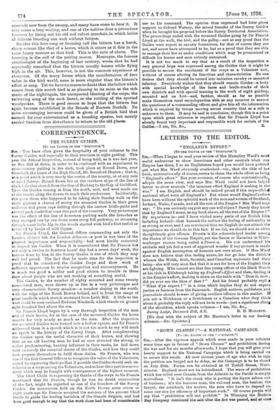CORRESPONDENCE.
THE SURREY GUIDES.
ITO THE EDITOR OF TEl " SPECTATOR:I Brit,—Yon have often given the hospitality of your columns to the Surrey Guides, and especially to their practices in night guiding. This year the Annual Inspection, instead of being hold, as it was last year, on Box Hill at dawn, in order to be combined with an experiment in cross-country guiding in the dark, took place at Round Down, near Gornehall, the house of the High Sheriff, Mr. Boresford Heaton ; that is, at a point which is very nearly the centre of the county, or at any rate of rural Surrey. Round Down lies on the southern slope of the line of chalk hills that stretch from the Gap of Dorking to the Gap of Guildford. Thus the Guides coming in from the north, east, and west made use of the tracks along the downs to reach their rendezvous. Incidentally, this gave those who happened to be taking their Sunday walk on the chalk plateau a chance of seeing the mounted Guides in their green uniforms and green caps defiling through the narrow bridle-paths and ancient pack-roads that scam this part of the country. Very picturesque was the effect of the line of horsemen pushing aside the branches as they emerged one by one down some stoop hill pathway, or streaming through some little Alp in the woods starred with bird's-foot trefoil or bordered by banks of wild thyme.
hir Francis Lloyd, the General Officer commanding not only the London district but the London defences—a post in war time of the greatest importance and responsibility—had most kindly consented to inspect tho Guides. When it is remembered that Sir Francis has not only a twelve to fourteen hours' day but a seven days' week, the honour done by him to the Surrey Guides is one of which they may well feel proud. The fact that he made time for the inspection is proof that ho considered the Guides Corps and their work of sufficient importance to receive recognition and encouragement. Ho Is much too good a soldier and good citizen to trouble in these days about people who are not working at something useful.
The Guides, to the number of eighty mounted and some twenty unmounted men, were drawn up in line in a very picturesque and very characteristic Surrey meadow—a meadow sloping to the south, with the ridge of the North Downs behind, and in front the range of great sandhills which stretch westward from Leith Hill. A little to the west could be seen outlined Ewhurst Windmill, which stands on ground sight hundred feet above the sea.
Sir Francis Lloyd began by a very thorough inspection of the men ar-d of their horses, for in the case of the mounted Guides the horse counts for very nearly as much as the man. After tho inspection the mounted Guides were formed into a hollow square, and Sir Francis addressed them in a speech which it is not too much to say will mark an epoch in the history of the Surrey Corps. After complimenting the Guides upon the useful character of their horses, and showing that 49 an old hunting man he had at once detected the strong, or rather predominating, hunting influence in their ranks, he laid down very incisively the essential duties of the Guides, and how they could best prepare themselves to fulfil those duties. Sir Francis, who was one of the first General Officers to recognize the value of the Volunteers, ended by expressing the hope that if possible the Guides should seek en- rohnent as a corps among tho Volunteers, and so bear their part in a move- ment which may be fraught with consequences of the highest moment.
The Chief Guide in expressing the thanks of the corps to Sir Francis mentioned that Sir Francis, though he was no doubt unconscious of the fact, might be regarded as one of the founders of the Surrey Cuides. On manceuvrf3a held on the North Downs some seven or eight years ago Sir Francis accepted the services of the present Chief Guide to guide the loading battalion of the Guards Brigade, and had been good enough to Bay that the work done had been of considerable
use to his command. The opinion thus expressed had later given support to Colonel Watney, the actual founder of the Surrey Guides when he brought his proposal before the Surrey Territorial Association. The proceedings ended with the mounted Guides going by Sir Francis Lloyd at the walk, the trot, and the gallop—not as any proof that the Guides were expert in cavalry formations, for that of course they are not, and never have attempted to be, but as a proof that they are able to manage their hones under conditions which may be pronounced as difficult for horses and men entirely untrained.
It is not too much to say that as a result of the inspection a - very general hope was expressed among the Guides that it might be possible to secure the enrolment of the corps as a Volunteer unit, without of course altering its functions and characteristics. No one desires that they should be turned into imitation cavalry or mounted Infantry. Everybody wishes that they should remain Guides—a body with special knowledge of the lanes and bridle-tracks of their own districts and with special training in the work of night guiding, mounted and on foot—and, further, should as far as possible make themselves rural encyclopaedias able at any moment to answer the questions of a commanding officer, and give him all the information which is required by troops moving across country that as a rule is unknown to them. It may be said in conclusion, though this is a point upon which great reticence is required, that Sir Francis Lloyd has already found very important and responsible work for certain of the


































 Previous page
Previous page